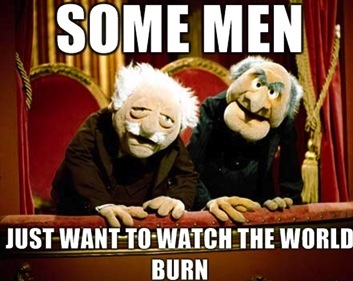Best Practices, Community Spotlights, Community Management Talks, Ning News, Social Media, Quick Tips, Tools & Tech
I'm finding more and more that I'm uncomfortable with the way that the term "troll" is becoming a catch-all word for "person who's doing something I don't like." It's an easy word to use: say "troll" and everyone says "Ahh," and nods their head in empathy. I've used this shorthand myself. And I'm resolving to stop using it and find out what's really behind the "troll."
 I think the turning point for me has been the recent Ars Technica article summing up a Canadian psychology journal article. Even the title is irksome: "Science confirms: Online trolls are horrible people (also, sadists!)" Almost every commentary I saw on the piece took the form of "A-ha! I was right! Trolls are terrible, awful, no-good people!"
I think the turning point for me has been the recent Ars Technica article summing up a Canadian psychology journal article. Even the title is irksome: "Science confirms: Online trolls are horrible people (also, sadists!)" Almost every commentary I saw on the piece took the form of "A-ha! I was right! Trolls are terrible, awful, no-good people!"
While it's true that there are some people on the internet who just really enjoy causing, stoking, and/or watching chaos happening online, that number is relatively small (and fairly concentrated). To give some anecdotal perspective, GetSatisfaction founders Lane Becker and Thor Muller recently spoke at an event about their early experiences at the company. They found that the moment they encountered their first real troll, a member whose sole purpose appeared to be to cause disruption and discontent and could not be reasoned with, was about 50,000 users in. Becker described that as ultimately uplifting: yeah, they had a troll, but the other 49,999 people in the communities were pretty decent human beings.
Labeling a member as a troll is dehumanizing, a dangerous mindset for community managers to get into. We are literally saying (albeit subconsciously) "this member doesn't deserve to be seen as another human being, but as a deformed, inhuman thing." It's become such a loaded word that once it enters a conversation, it taints what we hear afterwards. Once someone is labeled a "troll," anything they say starts to be viewed through troll-tinted glasses, even when they are being fairly reasonable. Instead of encountering a disruptive user and immediately jumping to this:
Let's look at ways that we can figure out why this person is causing a disruption.
- Is this member upset about something involving your product/community? If so, what's causing their frustration and how can you help them? Does a new product not work like the old product did? Offer them some help getting familiar with it. Are instructions not as clear as they could be? Look at how you can revise them.
- Is there a misunderstanding or a mistake happening? Is there a way you can prevent that in the future?
- Does the member need to feel that someone's listening to what they're saying? How can you show them you're listening?
Almost every article about traits or skills necessary for community management lists Empathy pretty high up. Make sure to turn your empathy filter on before labeling someone as a troll - you might just turn their behavior around.
What are your thoughts? Do you think "Troll" is a necessary definition in community management or are you going to rethink casual use of it?
Images via Know Your Meme, Tumblr